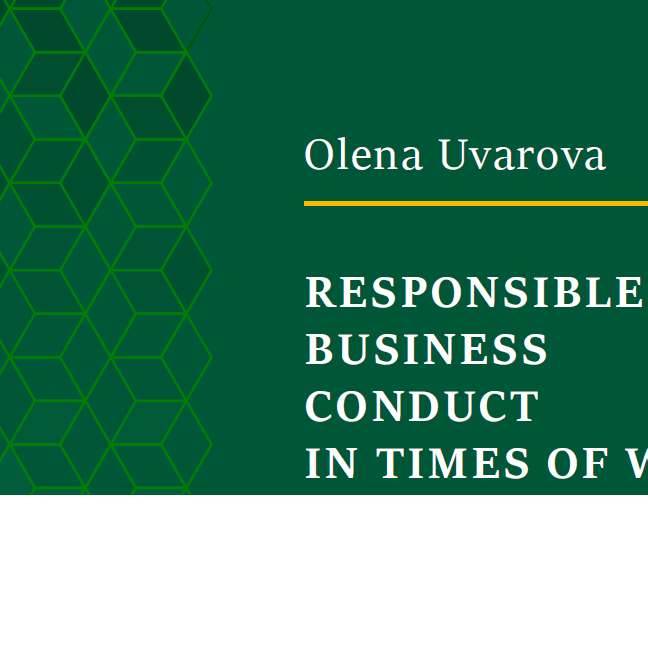New study: Responsible business conduct in times of war: Implications for essential goods & services providers in Ukraine

Olena Uvarova
Responsible business conduct in time of war: Implications for essential goods and services providers in Ukraine
Access to essential goods and services during war is critical. In many cases, people’s lives depend on it. The subject introduces many complex questions...and it is impossible to find one universal correct answer...In each specific situation, the answer must be sought anew. Finding such an answer requires understanding the context and the current situation as much as possible. However, whether companies ask themselves such questions, how they seek answers to them, and what interests they balance are all indicators of their efforts to implement responsible business conduct. ‘Essentiality’ is context specific. No fixed definition of essential goods/services exists in the strict sense. A frequently used term that can be interpreted more narrowly is the term ‘basic goods / services’, defined as goods/services in the social domain that should be available and reasonably accessible to everyone in need for them. Proper access to communications, drinking water, food, banking services, transport, electricity, healthcare and medicines, sanitation and garbage collection are important conditions for life. During the war, the basic needs of a person do not change, and in some cases their importance increases significantly – e.g., the ability to access public transport becomes critical for evacuation, access to the Internet becomes vital to obtain up-to-date information about possible threats, evacuation corridors, and humanitarian aid, and access to communication tools are necessary to keep in touch with family, call emergency services if necessary, and more. Essential services and goods have commonly been perceived as services and goods that are owned, managed and delivered by the state. Nevertheless, access to essential services and goods may be supplied by a private provider. Human rights are neutral as to economic models in general, and to models of service provision in particular...
The business and human rights framework calls on the state to provide recommendations to business on what risks war entails for human rights, what actions should be taken by business to minimize the risks of a negative impact on human rights, what forms of interaction between business and the state can be ensured to minimize such risks, and secure access to essential goods and services. Within this framework, business has its own responsibility to make all possible efforts to secure human rights.
This approach, which can be called the ‘respect (plus)’ scenario, highlights the tenuous and murky distinction between protecting and respecting human rights and is likely to be somewhat perplexing to companies searching for clarity around their responsibilities. It is based on the understanding that ‘more than respect may be required when companies perform certain public functions’. In such a situation, private enterprise should assume a parallel and complementary obligation (along with the State) to protect rights. It should be taken the subsequent step of placing a supplementary responsibility on the corporation to protect human rights where the State is unable or unwilling to do so. The obligations of companies should supplement and not replace State obligations...
Based on this, the general recommendations are:
- ...Companies whose business model includes the provision of essential goods and services initially take on a part of a public, socially significant, function. They should provide enhanced human rights due diligence requires companies, in particular to ask themselves:
Are you a supplier of essential goods and services? Do you occupy a key role in providing local people with access to essential services and good?
Did you continue to supply essential goods and services after the start of war / occupation of the territory?...
Was the decision made taking into account the local context and its dynamics?
Regardless of whether the company decides to continue operating or stop, it is important that the process to get to a decision should be consultative and build on local knowledge/information.
- Understanding of the heightened human rights due diligence as identifying potential and actual impacts on people (human rights) as well as on the context (conflict) should be supplemented with one more component, i.e. preventing or minimization of the conflict’s impact on people (human rights). The conflict could change significantly the scope of corporate responsibility to respect human rights. It’s not about a company’s impact on human rights, but it’s about its role in responding to human rights challenges that conflict creates. In some cases, we should talk about corporate responsibility to respect, fulfil, and promote human rights in situations of conflict. For example, should a company make every effort to help employees and their families with evacuation? Or should a company assess the essentiality of its products and services for local people in situations of conflict (for example, providers of internet and communication services could play vital role because their services provide people with a possibility to be informed about the situation, humanitarian aid etc)?
- Companies should make all possible efforts to engage stakeholders. In particular, it’s important for understanding of the context of conflict and its dynamic. And in conflict situations, local companies in many cases demonstrate much more responsible business conduct than multinational companies just because local companies are in direct communication with stakeholders who are impacted by conflict...
- Both business and state should build capacity to apply vulnerability lenses; for example, buildings, transport remained inaccessible to people with limited mobility in peacetime, despite the existence of legal requirements to ensure such accessibility. In many cases, this made it impossible to evacuate people with disabilities when war started. In addition, the lack of gender and work-life balance sensitivity made business decisions during wartime more burdensome for women and people with family responsibilities...